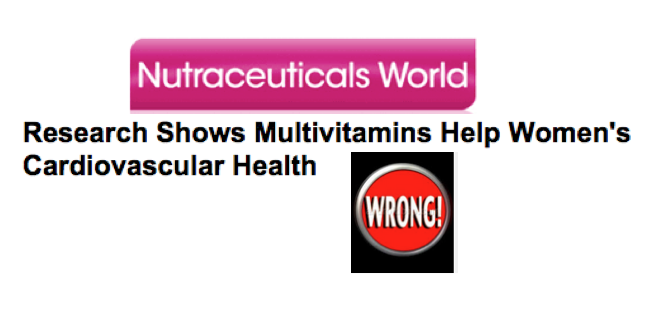
Observational studies are never valid for determining cause and effect. They can only establish a coincidental relationship or a trend. More often than not, these relationships are due to unknown factors, or are not even real. They are, rather, a result of flaws in the study—typically poor design, questionable statistical manipulation, or both.
Second, and just as important, is the design of this study. The mortality data on which the conclusions are based are inaccurate. This is because NHANES uses a probability protocol — an algorithm that picks the most likely match between a study subject and reports of death from a mortality database. But, probability protocols are merely models, and this adds further inaccuracy. Worse still, the determination of cause of death is based on diagnosis coding, which is neither standardized nor controlled. So, any conclusions about a potential correlation are necessarily based on weak data.Properly conducted randomized studies have over and again shown harm from wholesale vitamin supplements.
One needs only to visit the National Cancer Institute’s website to learn that none of the nine large prospective randomized trials of antioxidant supplementation to prevent cancer found any benefit. Moreover, in many of these studies, supplementation actually caused an increase in cancers. For example, supplementation of beta-carotene and retinol (Vitamin A) caused an increase in the incidence of lung cancer, and an increase in the rate of death from any reason. This is, of course, counterintuitive to the majority of Americans who have believed in the “goodness” of vitamins since childhood.
The bottom line is that all studies are not created equal. Some are bad, and some are excellent. But there is always someone more than willing to take advantage of the confusion. Remember, before you rush to the next nutritional fad, if it sounds too good to be true, it is.
Josh Bloom, Ph.D., is a former medicinal chemist and the Director of Chemical and Pharmaceutical Sciences at the American Council on Science and Health. David Seres, MD, ScM, PNS, is associate professor of medicine in the Institute of Human Nutrition and director of medical nutrition, Columbia University Medical Center. He is a member of the medical advisory board at Consumer Reports, and a Columbia Public Voices fellow with the Op-ed Project




Comments